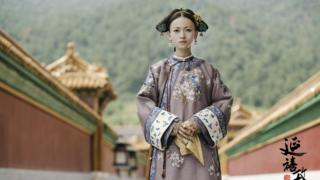A guide to the most Googled show on Earth
It has love but also hatred, intrigue, revenge, poisoning rivals and even killing babies.
The Chinese drama Story of Yanxi Palace is the most Googled TV show of 2018 globally, despite Google being largely blocked in the country.
The search engine’s analytics suggested that the top interest in the drama has come from Asian regions like Singapore, Malaysia, Brunei and Hong Kong, but its popularity in mainland China has been overwhelming as well.
The series has been streamed more than 15 billion times on iQiyi, China’s Netflix-like site where the show premiered in July before it reached domestic TV channels and more than 70 markets abroad. It was the most watched online drama in China for 39 consecutive days over the summer.
The 70-episode Story of Yanxi Palace fictionalised the power struggles among the concubines of Emperor Qianlong in the 1700s.
The protagonist, a smart girl with a humble background, manages to rise through the ranks among the harem and wins both love and respect from the emperor.
Its theme may be likened to a Cinderella tale or Netflix’s The Crown that chronicles the reign of Queen Elizabeth II. But its own uniqueness has made it the undisputed entertainment sensation of the year.
Here’s how it took over China and its neighbouring regions.
It catches up with a trend of feminist shows
The heroine of the show, Wei Yingluo, is unlike most traditional Chinese female characters who are taught to be tolerant, submissive and fragile.
Inspired by the actual real-life consort of Emperor Qianlong, the story follows Yingluo as a woman of Chinese Han ethnicity in the Qing dynasty – the last imperial dynasty in China ruled by the Manchurian ethnicity that suppressed the Han people.
But her intelligence, determination and appropriate ferocity meant she was eventually granted her the title of imperial noble consort, the highest possible position for a Han person at that time.
Yingluo’s most famous line from the show goes like this : “I, Wei Yingluo, am naturally hot-tempered and not to be pushed around. Whoever keeps talking [nonsense], I have all kinds of methods to go against her.”
The woman she is based on – Xiaoyichun – was posthumously given the title of empress, making her the only Han empress during the Manchu-reigned dynasty.
The show comes as the latest example of how feminist-themed soap operas have captured Chinese audiences.
Other shows like The Legend of Zhenhuan – another imperial rising-up-the-ranks story bought by Netflix – and The Empress of China, that tells the story of the only female emperor in Chinese history, have also taken off in China.
It didn’t face much censorship
Before the show aired on TV screens, it was shown online.
The co-producer and initial distributor of the series, iQiyi, is one of China’s most popular online video platforms – helping the show gain large traffic and, more importantly, easier regulatory scrutiny for its debut.
In China, the National Radio and Television Administration oversees all content on radio and television. A TV project has to obtain the go-ahead from it even before shooting starts.
When video sites emerged a few years ago, they could publish anything as long as they thought it was within the regulator’s rules.
In 2016, an online series featuring gay love went viral but was taken off in the middle of the streaming season. A year later, a a ban on homosexual content was issued.
Online video platforms can’t broadcast shows at will but the censorship they go through is much lighter than TV channels, which are mostly owned by the government.
Low-cost cast, high-quality production
No actor in the show is very famous, except for one Hong Kong actress, Charmaine Sheh, who was willing to play a supporting role.
Gong Yu, founder and CEO of iQiyi, said the company had “deliberately cast lesser known actors… rejecting recent trends in the Chinese industry that put too much emphasis of the celebrity appeal of actors in their productions”.
It came at an essential time when Chinese celebrities’ high income and ambiguous tax practices had caught the attention of the authorities.
Total spending on the show’s cast didn’t even reach one tenth of the total production cost, according to Chinese magazine Portrait citing series producer Yu Zheng, who added that the rest of the money was mainly spent on things like costume and make-up.
The well-built sets, elaborate costumes, make-up and attention to detail have won viewers’ love.
For example, concubines in the show wear three earrings on each side, as was the tradition of Manchu women at that time.
So if you’ve never heard of Yanxi Palace, you could try Googling it – you wouldn’t be the first.
Source: Read Full Article



